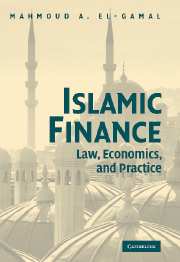Book contents
- Frontmatter
- Contents
- List of Illustrations
- Preface
- Glossary and Transliteration
- 1 Introduction
- 2 Jurisprudence and Arbitrage
- 3 Two Major Prohibitions: Riba and Gharar
- 4 Sale-Based Islamic Finance
- 5 Derivative-Like Sales: Salam, Istisna', and 'Urbun
- 6 Leasing, Securitization, and Sukuk
- 7 Partnerships and Equity Investment
- 8 Islamic Financial Institutions
- 9 Governance and Regulatory Solutions in Mutuality
- 10 Beyond Shari'a Arbitrage
- Conclusion
- Notes
- Bibliography
- Index
2 - Jurisprudence and Arbitrage
Published online by Cambridge University Press: 06 July 2010
- Frontmatter
- Contents
- List of Illustrations
- Preface
- Glossary and Transliteration
- 1 Introduction
- 2 Jurisprudence and Arbitrage
- 3 Two Major Prohibitions: Riba and Gharar
- 4 Sale-Based Islamic Finance
- 5 Derivative-Like Sales: Salam, Istisna', and 'Urbun
- 6 Leasing, Securitization, and Sukuk
- 7 Partnerships and Equity Investment
- 8 Islamic Financial Institutions
- 9 Governance and Regulatory Solutions in Mutuality
- 10 Beyond Shari'a Arbitrage
- Conclusion
- Notes
- Bibliography
- Index
Summary
The previous chapter highlighted the irony in reports that “Islam forbids interest” or “the Qurʾan forbids interest,” followed by a statement of the interest rate paid by Islamic instruments (e.g., sukuk). Some practitioners may be more cognizant of this problem and choose to report that the “profit rate” or “return” paid on their interest-free bond is a fixed 4 percent, or floating LIBOR plus 50 basis points. Indeed, many Islamic finance practitioners would be genuinely offended if someone asked them about the interest rate they charge, say, on Islamic mortgages. They may be slightly less offended if asked about “the implied interest rate,” computed from the deferred price they charge in a credit sale, or the rent they charge in a lease-to-purchase or declining-partnership agreement.
Such discrepancies between rhetoric and practice are not only problematic from an intellectual standpoint. They also lead to disillusionment with the industry for many educated Muslims, who may otherwise be its primary customers. Similarly, this rhetoric drives away many conventional financial providers, who could otherwise be the primary providers of Islamic financial services. To those practitioners, it is clear that there is no such thing as finance without interest. They find endless “research” on whether or not discounting is allowed in Islam to be silly and decide to ignore the industry altogether.
- Type
- Chapter
- Information
- Islamic FinanceLaw, Economics, and Practice, pp. 26 - 45Publisher: Cambridge University PressPrint publication year: 2006
- 1
- Cited by



